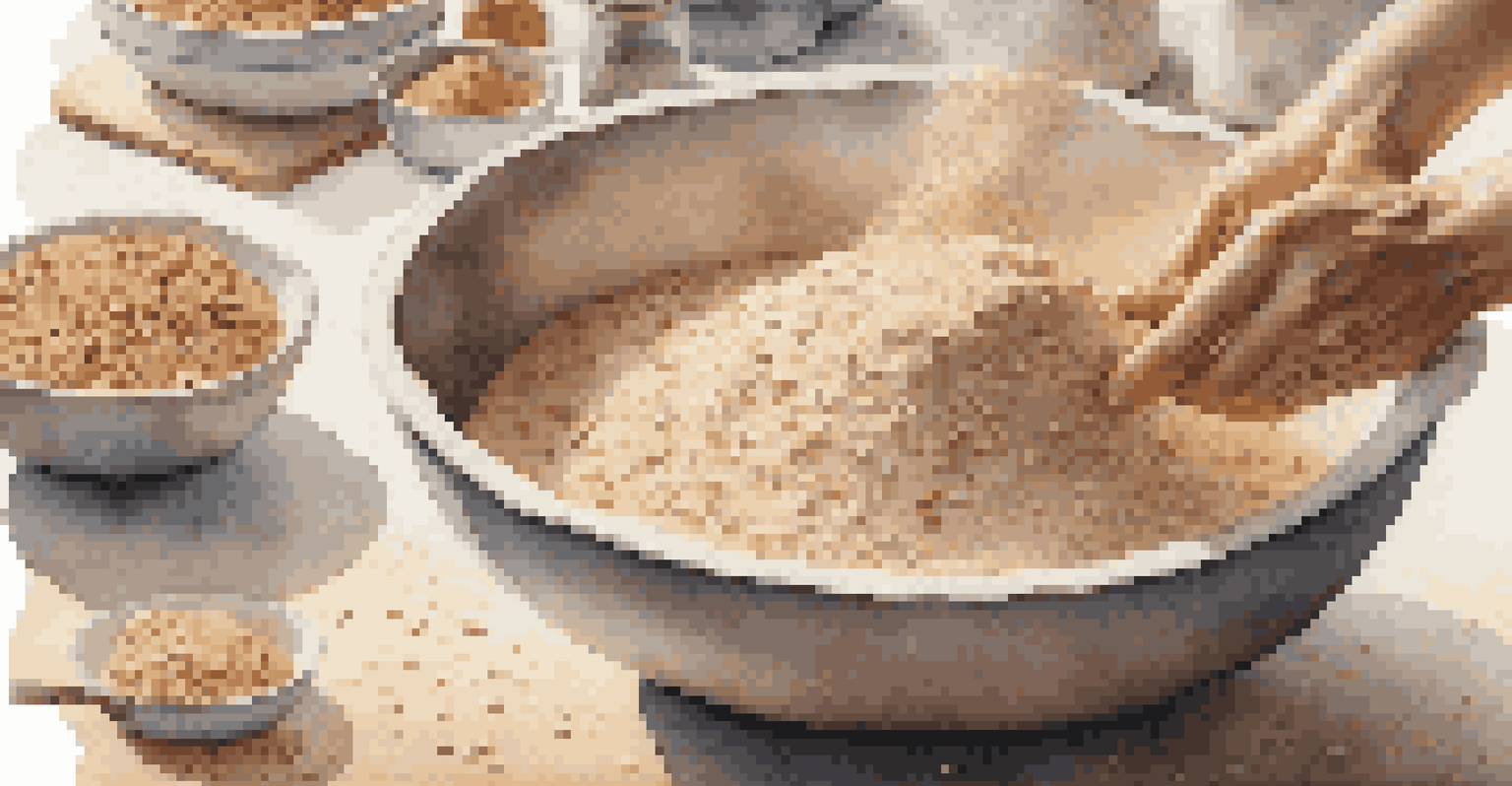The Health Benefits of Using Whole Grains in Pastries

Whole Grains: A Nutritional Powerhouse for Pastries
Whole grains are often overlooked in the world of pastries, yet they pack a nutritional punch. Unlike refined grains, whole grains retain all parts of the grain, including the bran, germ, and endosperm. This means they provide more fiber, vitamins, and minerals, making your favorite treats not just tasty but also healthier.
Whole grains are the perfect example of how delicious can be healthy.
Incorporating whole grains into pastries can transform a simple dessert into a nourishing snack. For example, substituting whole wheat flour for all-purpose flour can significantly increase the fiber content, which is essential for digestive health. This swap not only elevates the nutritional value but also adds a delightful nutty flavor that many people enjoy.
Moreover, whole grains can help maintain steady energy levels throughout the day. Unlike refined grains that can cause spikes in blood sugar, whole grains digest slowly, leading to a more gradual release of energy. This means you can enjoy your pastries without the dreaded energy crash.
Boosting Fiber Intake with Whole Grain Pastries
Fiber is a crucial component of a healthy diet, and whole grains are an excellent source. Many people struggle to meet their daily fiber needs, but adding whole grain pastries can help bridge that gap. For instance, a slice of whole grain banana bread can provide a significant portion of the recommended daily fiber intake.

Fiber not only aids in digestion but also helps keep you feeling full longer, which can be beneficial for weight management. When you enjoy a pastry made with whole grains, you’re likely to feel satisfied with a smaller portion, allowing you to enjoy treats without overindulging. It's a win-win situation for your taste buds and your waistline.
Whole Grains Enhance Nutrition
Substituting whole grains in pastries boosts fiber, vitamins, and minerals, making treats healthier.
Additionally, a high-fiber diet is linked to a reduced risk of chronic diseases, such as heart disease and diabetes. By choosing whole grain pastries, you're making a small but impactful change that can contribute to your long-term health.
Whole Grains and Heart Health: A Natural Connection
Heart health is a vital concern for many, and whole grains can play a significant role in promoting cardiovascular well-being. Research has shown that consuming whole grains is associated with lower cholesterol levels and reduced blood pressure. By incorporating whole grain pastries into your diet, you can enjoy delicious treats while also supporting your heart.
Eating whole grains is not just about nutrition; it's about the experience of flavor and texture.
For example, using oats in cookies or muffins can be a fantastic way to boost heart-healthy nutrients. Oats are rich in beta-glucans, a type of soluble fiber known to lower cholesterol. So, when you indulge in that oatmeal cookie, you’re not just treating yourself; you’re also doing something good for your heart.
Moreover, the antioxidants found in whole grains can help reduce inflammation, a key factor in heart disease. By choosing whole grain pastries, you’re not just enjoying a sweet delight; you’re also investing in your overall health.
Managing Blood Sugar Levels with Whole Grain Choices
For those concerned about blood sugar levels, whole grains can be a game changer. The complex carbohydrates in whole grains digest more slowly than refined grains, leading to a steadier release of glucose into the bloodstream. This can help prevent the rapid spikes and crashes associated with sugary pastries made from white flour.
Consider enjoying a whole grain pastry like a bran muffin or a whole wheat croissant. These options not only satisfy your cravings but also provide a more balanced approach to enjoying sweets. By making this simple switch, you can enjoy your favorite pastries while keeping your blood sugar in check.
Support Heart Health with Grains
Whole grains can lower cholesterol and blood pressure, promoting cardiovascular well-being.
In addition, the fiber content in whole grains can enhance insulin sensitivity, which is vital for maintaining healthy blood sugar levels. So, next time you're craving something sweet, reaching for a whole grain option can be a smart choice.
Whole Grains and Weight Management: A Delicious Ally
When it comes to weight management, whole grains can be an excellent ally. The fiber in whole grains helps promote feelings of fullness, which can reduce overall calorie intake. This means you can enjoy your pastries without the guilt, knowing they can support your goals.
Think about enjoying a slice of whole grain coffee cake with your morning brew. Not only does it satisfy your sweet tooth, but the fiber content can help you feel full, reducing the temptation to snack later. By choosing whole grain options, you’re making a choice that can aid in your weight management journey.
Furthermore, whole grains can enhance your metabolism. They require more energy to digest compared to refined grains, meaning your body burns more calories during the digestion process. So why not indulge in a whole grain pastry and give your metabolism a little boost?
Exploring Flavor and Texture with Whole Grains
One of the often-overlooked benefits of using whole grains in pastries is the unique flavor and texture they bring. Whole grain flours can add a rich, nutty taste that elevates the overall experience of your baked goods. For instance, a whole grain chocolate chip cookie can surprise you with its depth of flavor, making it a delightful treat.
In addition to flavor, whole grains contribute to a satisfying texture. Pastries made with whole grains often have a heartier, chewier quality, which many people find appealing. This texture can enhance the enjoyment of every bite, turning a simple pastry into a memorable experience.
Flavorful and Satisfying Options
Using whole grains adds unique flavors and textures, turning ordinary pastries into memorable delights.
Ultimately, experimenting with whole grains opens the door to a world of culinary creativity. From hearty muffins to rich bread, the options are endless. By embracing whole grains, you’re not just prioritizing health; you’re also embarking on a delicious journey.
Tips for Incorporating Whole Grains into Pastry Recipes
Incorporating whole grains into your pastry recipes doesn't have to be daunting. Start by substituting half of the all-purpose flour with whole grain flour; this allows you to enjoy the benefits without sacrificing texture. For example, if you're baking a classic pie crust, try using half whole wheat flour for a wholesome twist.
Another great tip is to experiment with different whole grain options. Quinoa flour, oat flour, or spelt flour can all bring unique flavors and textures to your pastries. This exploration can lead to exciting new creations and a chance to discover your new favorite treat.

Lastly, don’t forget about adding whole grains in other forms, such as oats, seeds, or even cooked grains. Tossing some rolled oats into your cookie dough or sprinkling seeds on top of muffins can enhance both the nutrition and taste. With these simple adjustments, you can enjoy delicious pastries that also nourish your body.